Flowering shrubs can solve several problems at once during the design of the site. With their help, you can create a beautiful background for flower beds, flower beds and other compositions, emphasize individual elements (benches, garden figures, lights), decorate various outbuildings, and also delimit the territory. When choosing a shrub for a specific area of the garden, it is important to consider the height of the adult plant and the requirements for growing conditions.
Flowering shrubs
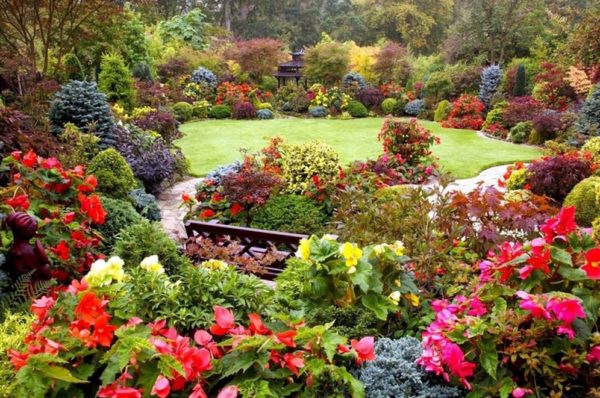 The first to distinguish are low flowering shrubs growing up to 100 cm, the most common: Kariopteris, Groundcover Rose, Ceratostigma, Dabecia Cantabrian, Cistus, Alice clematis, Cassiopeia, Dwarf Spirea and Heather. Of great interest to gardeners are tall and medium-tall bushes with a long flowering period. They are suitable for background design and hedges.
The first to distinguish are low flowering shrubs growing up to 100 cm, the most common: Kariopteris, Groundcover Rose, Ceratostigma, Dabecia Cantabrian, Cistus, Alice clematis, Cassiopeia, Dwarf Spirea and Heather. Of great interest to gardeners are tall and medium-tall bushes with a long flowering period. They are suitable for background design and hedges.
Top 5 Shrubs for the Garden:
- Chubushnik (Jasmine garden).
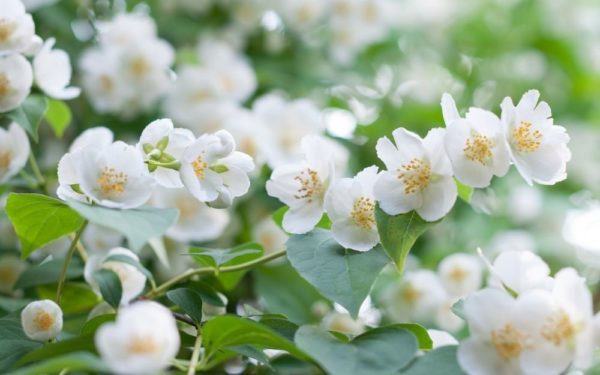 Among the varieties there are terry and large-flowered forms. The color of the petals is white, the opened buds have a strong, pleasant aroma. The height of the bush is from 1, 5 to 2 meters. Flowering begins in June, lasts a little more than 3 weeks. 2 years after planting, regular pruning is required. During the summer, at least 3 organic dressings should be carried out. Almost all types of Chubushnik are frost-resistant and unpretentious, but the plant does not develop well in the shade and in places with swampy soil.
Among the varieties there are terry and large-flowered forms. The color of the petals is white, the opened buds have a strong, pleasant aroma. The height of the bush is from 1, 5 to 2 meters. Flowering begins in June, lasts a little more than 3 weeks. 2 years after planting, regular pruning is required. During the summer, at least 3 organic dressings should be carried out. Almost all types of Chubushnik are frost-resistant and unpretentious, but the plant does not develop well in the shade and in places with swampy soil. - Spirea.
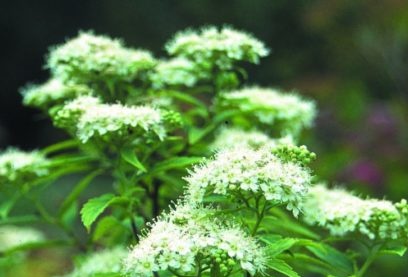
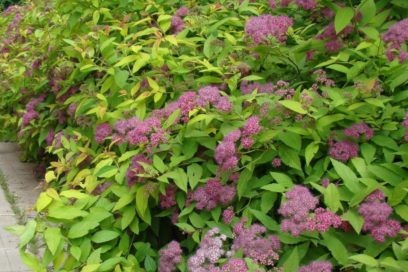 Undemanding to care, photophilous, frost-resistant plant, from 50 cm to 2 meters high. Species are conditionally divided into 2 categories: spring and summer. The former bloom in small white flowers from May to June; in the latter, pink buds open in July. The longest flowering period in billiard spirea is from the first decade of July to the last days of October. Pruning should be carried out from 5 years after planting, the plants develop well, bloom without frequent top dressing.
Undemanding to care, photophilous, frost-resistant plant, from 50 cm to 2 meters high. Species are conditionally divided into 2 categories: spring and summer. The former bloom in small white flowers from May to June; in the latter, pink buds open in July. The longest flowering period in billiard spirea is from the first decade of July to the last days of October. Pruning should be carried out from 5 years after planting, the plants develop well, bloom without frequent top dressing. - Hydrangea.
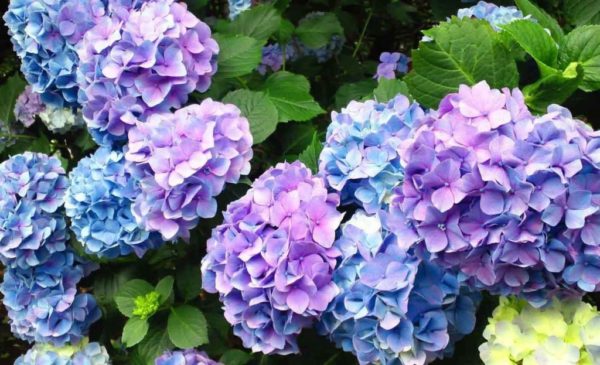 Easy to grow shrub, it is advisable to plant it in a bright area, but it is also possible in partial shade. Flowering begins in August, ends in early October. The color of the petals and the shape of the inflorescences depend on the variety. The plant is responsive to regular pruning and top dressing, it is better to take special fertilizers for Hydrangeas. Bushes no higher than 2 meters.
Easy to grow shrub, it is advisable to plant it in a bright area, but it is also possible in partial shade. Flowering begins in August, ends in early October. The color of the petals and the shape of the inflorescences depend on the variety. The plant is responsive to regular pruning and top dressing, it is better to take special fertilizers for Hydrangeas. Bushes no higher than 2 meters. - Bloodroot.
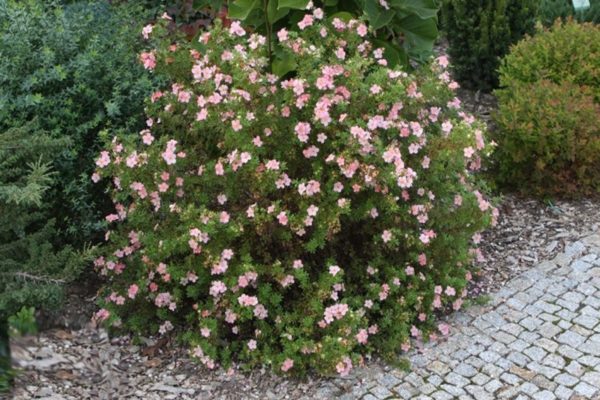 Unpretentious, frost-resistant plant with yellow-orange, pink or white flowers. It grows well only in light and nutritious soil, does not tolerate high humidity and strong shade. The height of the bush is up to 1.5 meters. In the spring you need to feed mineral fertilizers, and in the summer cut withered flowers. All kinds and varieties of potentilla bloom in summer.
Unpretentious, frost-resistant plant with yellow-orange, pink or white flowers. It grows well only in light and nutritious soil, does not tolerate high humidity and strong shade. The height of the bush is up to 1.5 meters. In the spring you need to feed mineral fertilizers, and in the summer cut withered flowers. All kinds and varieties of potentilla bloom in summer. - Action.
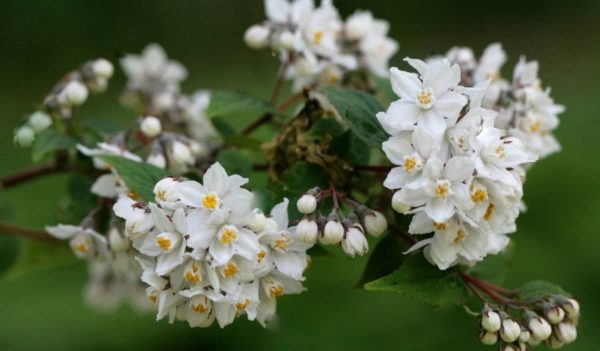 Shrub no higher than 2 meters, it can be planted in partial shade, under the crowns of large trees. In the middle zone, Deytsia tolerates frosty, snowy winters not bad, but in the northern regions it is better to refuse landing. The plant normally develops only in loose, fertile soil, does not tolerate a high level of groundwater. The bush requires annual pruning, watering in dry periods, and monthly (from spring to late autumn) top dressing. The shape of the flowers, color and flowering period depend on the variety.
Shrub no higher than 2 meters, it can be planted in partial shade, under the crowns of large trees. In the middle zone, Deytsia tolerates frosty, snowy winters not bad, but in the northern regions it is better to refuse landing. The plant normally develops only in loose, fertile soil, does not tolerate a high level of groundwater. The bush requires annual pruning, watering in dry periods, and monthly (from spring to late autumn) top dressing. The shape of the flowers, color and flowering period depend on the variety.
The list is small, so we recommend that you take a closer look at plants such as Lilac, Japanese Quince (Henomeles), Kalmya, Rhododendron, Forsythia, Magnolia, Skumpiya, Buldenezh, Hawthorn, Bubble and Weigela. Also worth noting are Broom, Bubble, Indian Lagerstrom, Red Rhizome (Zeanotus), Kelreiter, Indigofer Gerard, Beresklet, Tree Peony, Ryabinnik, Hibiscus, Louiseania and Tamarix.
Useful Tips
Plants are better to buy in nurseries, as they were grown in local climates, quickly adapt and take root. In the first 3-4 years, shelter will be required even for a fully grown, frost-resistant shrub. The landing site should be selected carefully, if you place a photophilous plant even in partial shade, lush and bright flowering can not wait.
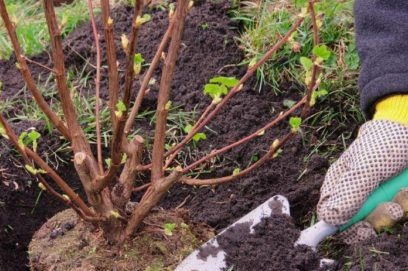 The landing site needs to be prepared in advance, digging the soil, applying organic fertilizers. You should not ignore the haircut and pruning, the overgrown bush will bloom weakly, lose immunity to diseases and pests. The procedure should be carried out in early spring or autumn. With top dressing, you need to be careful, flowering can weaken from lack and excess of nutrition. In late autumn, foliage should be raked into the trunks to protect the roots from frost.
The landing site needs to be prepared in advance, digging the soil, applying organic fertilizers. You should not ignore the haircut and pruning, the overgrown bush will bloom weakly, lose immunity to diseases and pests. The procedure should be carried out in early spring or autumn. With top dressing, you need to be careful, flowering can weaken from lack and excess of nutrition. In late autumn, foliage should be raked into the trunks to protect the roots from frost.
To choose flowering shrubs necessary based on the objectives, taking into account the features of the site. If desired, a bright composition can be created from different types of plants, which will delight with lush flowering from early spring to late autumn. There is a place for a decorative bush even in a small garden, covered with a scattered shadow from the crowns of trees, many of them are unpretentious and do not require painstaking care.


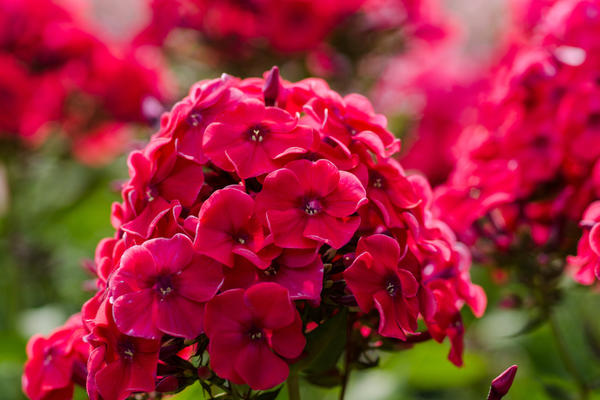
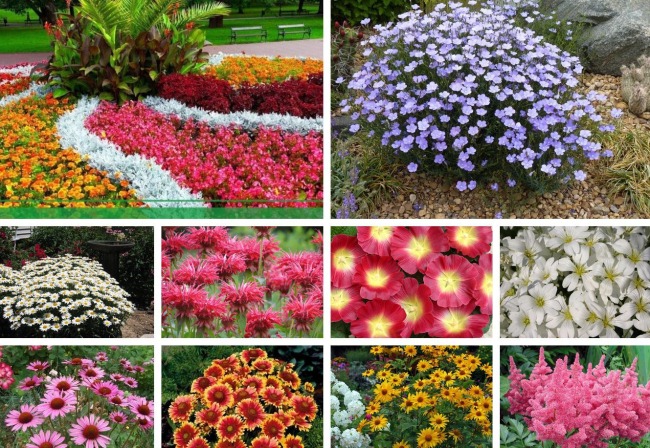
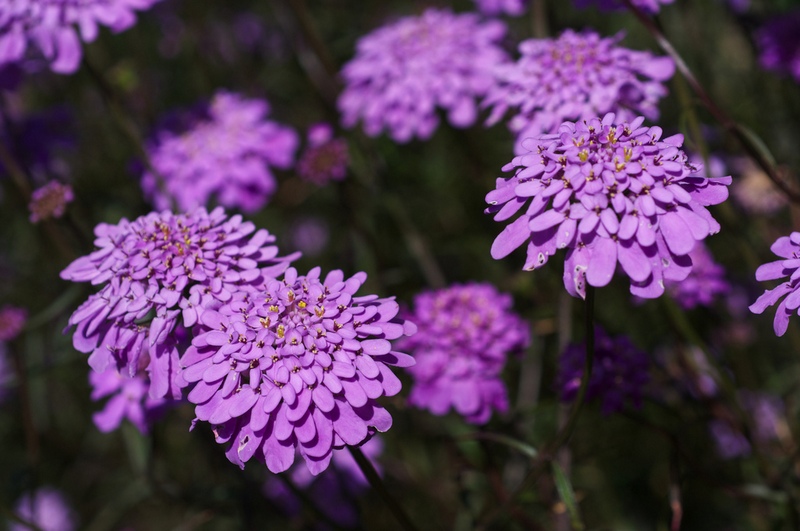 Sow in the ground, without seedlings: 10 beautiful and unpretentious flowers
Sow in the ground, without seedlings: 10 beautiful and unpretentious flowers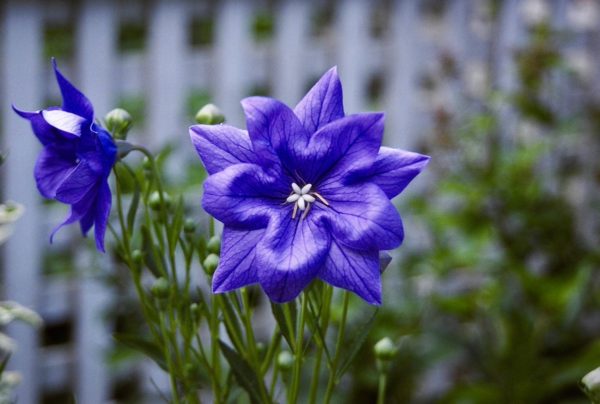 Platicodon planting and outdoor care
Platicodon planting and outdoor care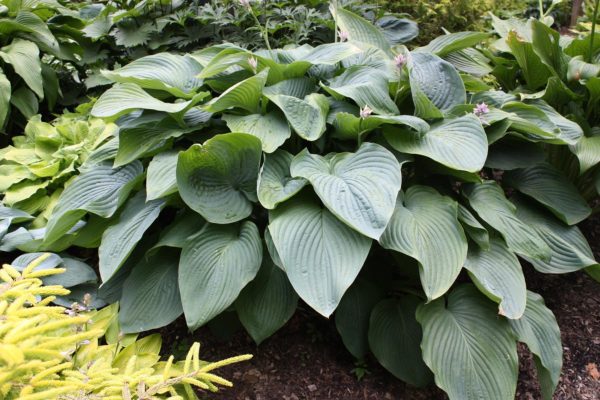 Hosta - planting and care in the open ground in the Urals
Hosta - planting and care in the open ground in the Urals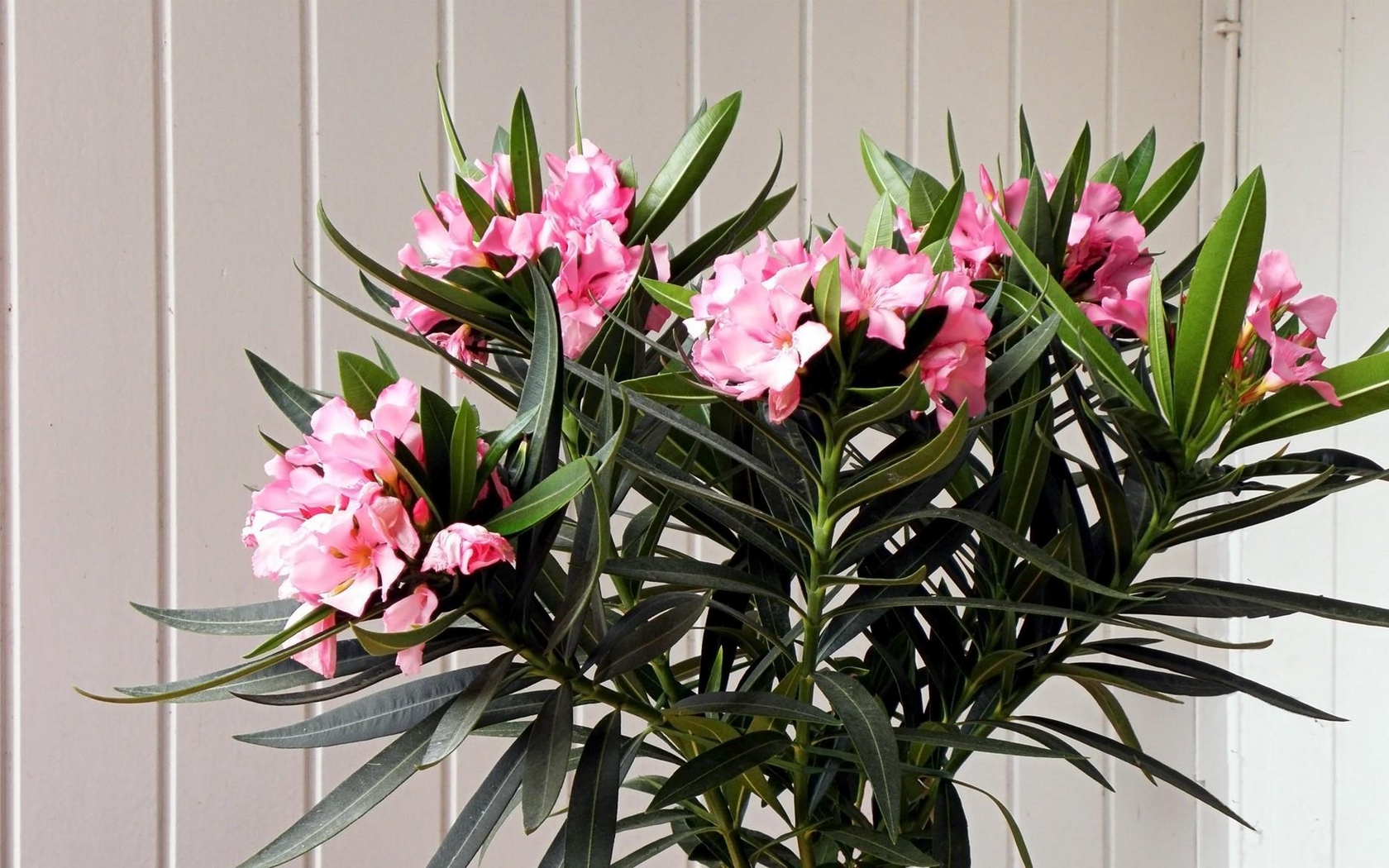 Oleander - care and growing at home
Oleander - care and growing at home